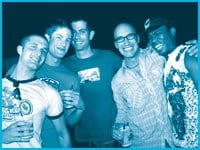AIDS WALK NUMBERS DOWN
Paul Lewand is alarmed. Even fewer people than last year have registered to walk in the upcoming AIDS Walk, says the new chair of the BC Persons with AIDS Society (BCPWA). Last year, the numbers were already lower than usual, he notes. In fact, last year, for the first time ever, the AIDS Walk failed to surpass its previous year’s fundraising total. So far this year, only 170 people have signed up. But there’s still time, Lewand stresses, urging people to please “get out, register and walk.”
As always, money raised by the walk will be divided between its organizing partners, including BCPWA. Lewand says his group will put the money directly into its complementary health fund, which its HIV-positive members can then use to pay for clean water and alternative therapies, such as massage, acupuncture and yoga. Alternative therapies can be really helpful, Lewand explains, because they can help curb the diarrhea, headaches and other side effects induced by the HIV medications. “It’s not like taking an Aspirin,” he notes. “Even [medications] which help are hell, or can be.” But most HIV-positive people can’t afford alternative therapies because they barely have enough money to survive after they pay the rent, he says. A lot of PWAs are too sick to work so they rely on disability benefits from the provincial government to survive. The government gives them $786 a month plus an extra $225 nutritional supplement. With the average one-bedroom apartment in Vancouver renting for about $750, that doesn’t leave much money for nutritious food and alternative therapies, Lewand points out. That’s why he’s urging everyone to put their apathy aside and sign up for this year’s AIDS Walk, Sep 26. “I’m hoping this year to raise $470,000. Wouldn’t that be incredible? That would turn the trend back around.”
Vancouver AIDS Walk: Sun, Sep 26, begins at 11 am at Upper Ceperley Park in Stanley Park. Same-day registration begins at 8:30 am. To sign up call 604.915.WALK.
***
STOP THE VERBAL ABUSE
It was witnessing three episodes of verbal abuse in one night that spurred Tom McKenna to action. The first episode occurred late Fri night, Aug 20. McKenna and his husband were sitting in Hamburger Mary’s when a car raced down Davie St towards English Bay. One of the occupants stuck his head out the window and yelled, “All fags go to hell!” Later, standing on the balcony of his Nicola St apartment, McKenna watched a group of five people, possibly Indo-Canadians in their early 20s, verbally harass two separate individuals, one after the other. First they called out: “Are you a fag?” to one man, then 20 seconds later they called to another man: “You must be a fag because you’re wearing a red shirt!” When they got no response from either target, the group moved on. Worried the taunts might escalate into violence, McKenna called 911. The operator was “very helpful, very polite,” he later told Xtra West, adding that he was very satisfied with how seriously the operator treated his concerns.
“It was a really nice surprise.”
But McKenna didn’t stop there. The next morning, he wrote a two-page description of the incidents plus some safety tips, made 150 copies, and distributed them throughout the Davie Village. It’s offensive, says McKenna, of the verbal abuse that continues to target many queers in the Village. People come in hunting on weekends-“I feel like we’re a big game preserve.” And it has to stop, he says, urging everyone to take this form of harassment seriously and report it to police.
***
SUPREME COURT APPOINTEES
With same-sex marriage headed to the Supreme Court of Canada this fall-and perhaps a sex laws case within the next five years-the federal government has appointed two new judges with a history of positive gay and lesbian rulings.
Justice Louise Charron is probably the more conservative of the two picks. Called to the bar in 1977, she’s been on the Ontario Court of Appeal since 1995. She wrote the majority judgement in Ontario’s M vs H case that allowed gay and lesbian couples to seek alimony. That judgement was upheld by the Supreme Court of Canada in 1999, leading to the recognition of queer common-law spousal rights across Canada.
Rosalie Abella is a self-professed activist judge, who has made equality and minority rights a priority in her career. She was appointed to the bench in 1976 at age 29, making her Canada’s youngest person to be made a judge (and the first pregnant woman appointed). She had been a member of the Ontario Human Rights Commission. According to her Court of Appeal bio, she “was sole commissioner and author of the 1984 federal Royal Commission on Equality In Employment, in which she created the term and concept of ’employment equity,’ a new strategy for reducing barriers in employment faced by women, aboriginal people, non-whites, and persons with disabilities. The theories of ‘equality’ and ‘discrimination’ she developed in her report were adopted by the Supreme Court of Canada in its first decision dealing with equality rights under the Charter of Rights and Freedoms.”
In 1995, Abella rendered a ruling, later upheld by the Federal Court, which voided the law prohibiting unmarried people under 18 from having anal sex. She wrote: “Anal intercourse is a basic form of sexual expression for gay men…. Unmarried, heterosexual adolescents 14 or over can participate in consensual intercourse without criminal penalties; gay adolescents cannot. It perpetuates rather than narrows the gap for an historically disadvantaged group-gay men.”
In 1999, Abella authored the judgment in Rosenberg vs Canada, declaring that the word “spouse” in the Income Tax Act should include same-sex partners. In response, the federal government changed dozens of statutes to include same-sex partners.
Both judges are scheduled to be sworn in Oct 4.
* Paul Gallant

 Why you can trust Xtra
Why you can trust Xtra


